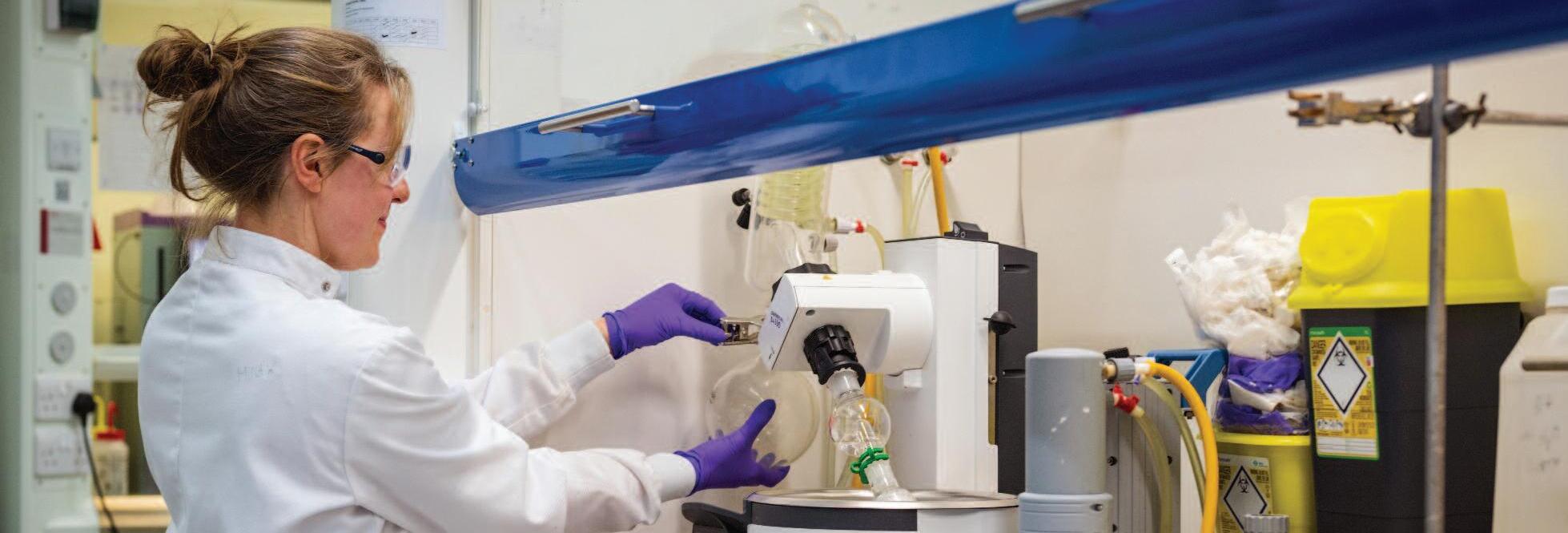
2 minute read
Innovation in Chemistry
Chemistry is fundamental to the drug discovery process. In WCAIR we have been looking at ways in which we can increase the efficiencies of our chemistry processes and the integration of chemistry with other disciplines to improve the design-make-test-analyse cycle.
The Synthetic Methodologies team has the remit of developing and delivering new chemical methods and technologies to the in-house medicinal chemistry teams The team has several project areas of current interest: increasing the rate of compound synthesis; increasing the number of compounds that can be synthesised at one time; and expanding the range of chemical space that is readily available to project teams The technologies developed and validated by the team has allowed chemistry to be delivered to project teams that would otherwise have been difficult or impossible The approaches developed have increased the range of molecules available to synthetic chemists and allowed faster delivery of compounds to speed drug discovery efforts
Advertisement
Plate Based Chemistry
To speed up chemistry synthesis and screening we have invested heavily in the development and introduction of automated plate-based synthesis methodology This approach can be carried out in 96- or 384-well-plates, allowing large numbers of analogues to be prepared in a format that allows transfer directly into screening assays It makes extensive use of computational chemistry in the design process, to generate many virtual compounds which can be filtered and selected by desired properties and then synthesis can begin We make extensive use of robotics to automate the processes as much as possible Another advantage is that it can be carried out on a very small scale, typically of the order of 0.1 mg per compound which is two hundred times less than traditional methods used within the DDU The DDU Compound Management team have been heavily involved in delivery of the project using their knowledge of reagent, compound and plate tracking and the use of automated liquid dispensing which is pivotal to the success of the technique
Late Stage Functionalisation and Diversification
We have been identifying and validating a dedicated set of reactions which allow functionalisation of elaborated molecules without extensive synthesis. This is useful to allow fast optimisation of late-stage molecules reducing the timelines to optimise compounds of interest
Flow chemistry
We have developed a fully capable flow chemistry set up that has allowed the synthesis and use of unstable intermediates and the safe generation and use of carbon monoxide. The system has also been upgraded and used for electrochemistry and light driven chemistry, increasing access to chemical space using these reagents and techniques
Biotransformations
We are investigating the use of biotransformations of molecules using enzymes. Some of this work is being carried out in collaboration with a small company called Hypha Discovery Ltd We are investigating which approaches give us access to molecules which are not easily made by conventional organic chemistry.
Route Development and Scale Up
The route development and scale up section of the team has two main responsibility areas. The first is to work with project teams and take chemistry off the critical path where a particular route or transformation is slowing the synthesis of final compounds. The second role is in developing and executing scale-up routes to allow the safe and efficient delivery of intermediates and final compound to project teams The team are regularly engaged in solving issues faced by project teams, synthesising useful intermediates and delivering final material at extremely high purity for in vivo testing.
Covalent Inhibitors
We have started to look at covalent inhibitors as a potential modality We have developed some mass spectrometry assays to identify residues which may be suitable for covalent modification and set up an NMR assay to determine the relative reactivity of different warheads.
New Chemical Space: screening Natural Product Libraries
Current phenotypic screening against the parasites often finds new series which inhibit the same targets as other chemical series. It is relatively rare that a novel drug target is revealed by a phenotypic screen, with the current small molecule synthetic libraries With a view to discovering potential new drug targets, we have started screening collections of natural products, accessed through collaborators. Hits are being fed back to our Mode of Action group to carry out target deconvolution










